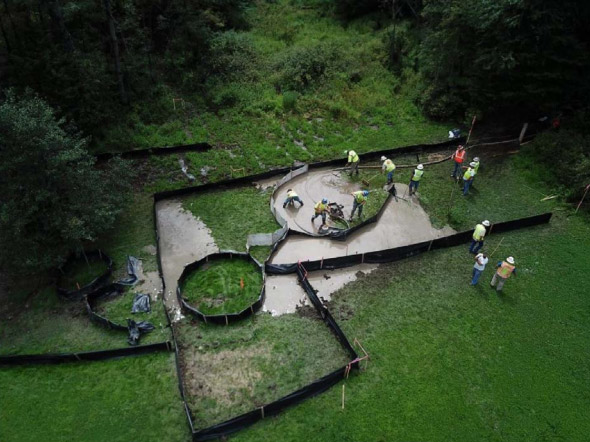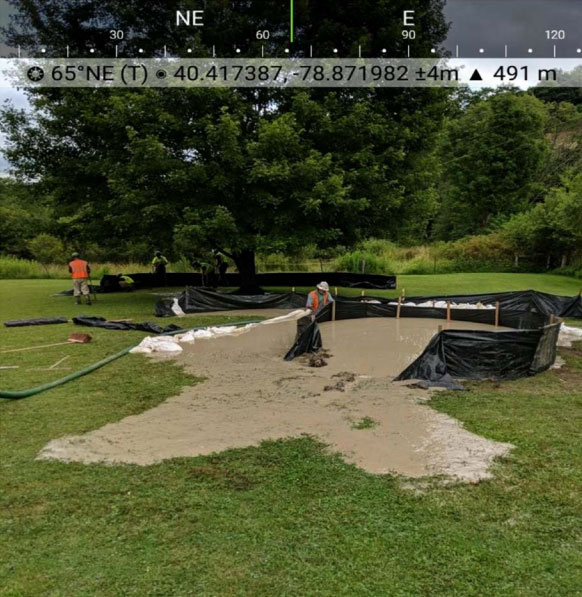
Mariner East 2 Pipeline charged in water contamination leaks
The developer of the Mariner East 2 Pipeline faces dozens of counts of violations of Pennsylvania environmental laws related to contaminating waterways.
| October 7, 2021
Rosemary Fuller of Delaware County, Pa., never had a problem with the well water at her house until construction began on a pipeline known as Mariner East 2, which would send natural gas liquids across Pennsylvania to an industrial complex on the Delaware River.
A land agent, acting on behalf of the pipeline builder, Sunoco, had assured her that the project would pose no risk because the work would be done underground through a process called horizontal directional drilling, which relies on high-pressure fluids to cut through the rock. She agreed to grant an easement.
But after the work began in 2017, Fuller noticed a drop in water pressure and odd-colored sediment in all of her home’s toilet tanks. The sediment went on to destroy a shower and the water heater, and the washing machine and dishwasher no longer worked properly, she testified before a grand jury.
Pipeline representatives told her the sediment would not affect the safety of her water. Sunoco’s initial sampling showed the presence of bentonite, which is used in the drilling process, but a company representative told her not to worry and she could continue drinking her water and showering in it because it was not harmful, state officials said.
But weeks later, testing revealed that Fuller’s water had high concentrations of E. coli and fecal coliform, and her daughter, who had used the water, had to be hospitalized, the grand jury report said.
Fuller was one of at least 150 families across Pennsylvania whose water supply was fouled by contaminants pervasively and illegally discharged during the pipeline’s construction, the state’s attorney general, Josh Shapiro, announced this week.
His office charged Energy Transfer, the corporate successor to Sunoco Pipeline, with 46 counts of environmental crimes in connection with the release of hundreds of thousands of gallons of contaminated drilling fluid that escaped underground and then surfaced in fields, backyards, streams, lakes and wetlands in violation of the state’s Clean Streams Law.
The charges stem from the release of industrial waste at 22 sites in 11 counties from February 2017 through May 2021, Shapiro said. At least three of those counties – Berks, Chester and Delaware – are in the Delaware River watershed.

Route of Mariner East Pipeline Credit: Landscapes2.org
The criminal case is being prosecuted against the corporate entity, which could face fines, and not its officers or executives. The Attorney General’s Office did not clarify how much the fines could amount to should Energy Transfer be convicted.
Shapiro defended charging the company and not individuals, noting that the case was still under investigation and that prosecutors filed charges wherever they could. Currently, no jail time can be imposed for those convicted of breaking state environmental laws, said Shapiro, who called on legislators to strengthen the laws to hold violators accountable.
“Corporations should not be treated leniently just because there’s not a mugshot of Energy Transfer being arrested today. They should be held accountable to the fullest extent of the law,” Shapiro said. “We can’t rely on these out-of-state companies to police themselves. Hell, they work for shareholders, not us.”
The pipeline has been plagued by environmental lapses, which has led the state Department of Environmental Protection to collect more than $20 million in civil penalties against the project for various violations.
Energy Transfer press representatives did not respond to a call and email seeking comment about the criminal charges. In a recent federal earnings report, the company acknowledged the grand jury investigation and a subpoena for documents.
“While the partnership will cooperate with the subpoena, it intends to vigorously defend itself,” the company said in the filing.
Shapiro said the erroneous releases of drilling fluid were frequent, damaging and went largely unreported by the company to the state DEP, despite a requirement that it do so.

Drilling fluid came up from the ground and into a pasture that flowed to an unnamed tributary in Cambria County, Pa., in July 2018, the grand jury report said. CREDIT: Grand jury report
The 64-page grand jury report painted a picture of a DEP that was outmatched in monitoring the vast project, which crosses 17 counties, including Berks, Chester, Delaware, Lancaster and Lebanon, which are in the Delaware River watershed.
The report said the DEP was not provided the resources to hire the additional expertise needed “nor did it fully respond to that reality.”
“DEP was also in need of other personnel, such as inspectors to patrol the spreads to oversee the actual construction process. The various regions made up for this by ‘borrowing’ employees from other programs within DEP, and from County Conservation Districts,” the report found “As a result, DEP could not be everywhere it needed to be on a project of this unprecedented magnitude.”
The pipeline transports natural gas liquids from the Marcellus and Utica Shales, which run through Pennsylvania, to an industrial complex in Marcus Hook, Pa., on the Delaware. At the end of 2020, the company had the capacity to export just over 1 million barrels of NGL per day.
It was not immediately clear what effect, if any, the criminal charges might have on the permits for the project, parts of which are already completed. Shapiro said his office was not in charge of issuing permits and deferred related questions to the DEP.
The DEP said in a statement that “permittees are obligated to ensure that their projects are constructed without incident and in full compliance with permits and if they fail to do this, they should and will be held accountable.”
The statement added that the department would review the charges filed by the attorney general’s office “and determine if any additional actions are appropriate at this time.”



![DC_Image [Image 4_Assunpink Meets Delaware] meets Delaware The Assunpink Creek on its its way to meet the Delaware River. The creek passes through woods, industrial and commercial areas and spots both sparkling and filled with litter.](https://delawarecurrents.org/wp-content/uploads/bb-plugin/cache/DC_Image-4_Assunpink-meets-Delaware-1024x768-landscape-14f069364113da5e8c145e04c9f2367c-.jpg)



